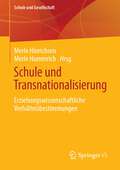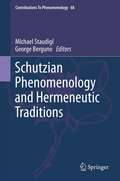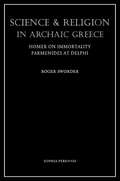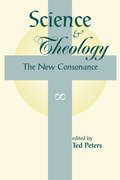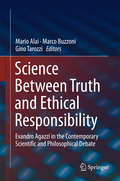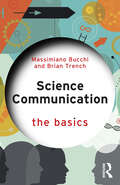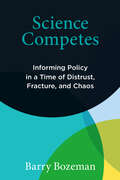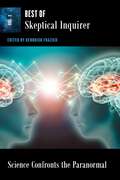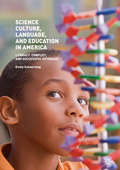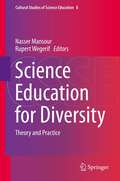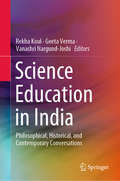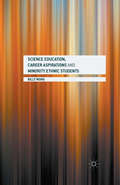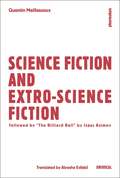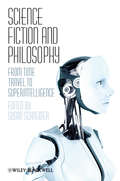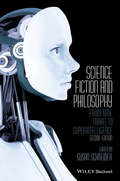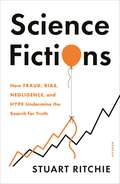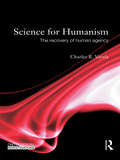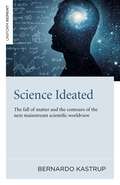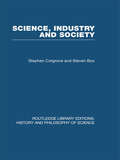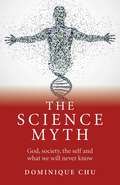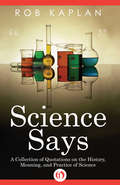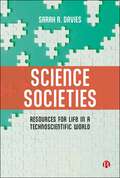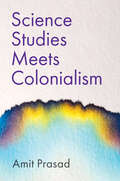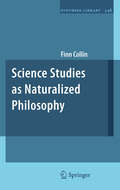- Table View
- List View
Schule und Transnationalisierung: Erziehungswissenschaftliche Verhältnisbestimmungen (Schule und Gesellschaft #66)
by Merle Hummrich Merle HinrichsenDas Buch bestimmt die Verhältnisse von Schule und Transnationalisierung angesichts globaler Migrations- und Fluchtbewegungen sowie vor dem Hintergrund zunehmender Internationalisierungs- und Digitalisierungsprozesse. Grenzüberschreitende Beziehungen und Verflechtungen von Schule und schulischen Akteuren sind in der Folge Bestandteil des schulischen Alltags. Mit Blick auf die Verknüpfung mit Bildung lassen sich zwei ungleichheitsrelevante Diskurse unterscheiden: Mobilität und Migration. Während Mobilität im Kontext Schule als erstrebenswerte Norm gilt, wird Migration vielfach als problematisch betrachtet.
Schutzian Phenomenology and Hermeneutic Traditions
by Michael Staudigl George BergunoSchutzian Phenomenology and Hermeneutic Traditions links Alfred Schutz to the larger hermeneutic tradition in Continental thought, illuminating the deep affinity between Schutzian phenomenology and hermeneutics. The essays collected here explore a broad spectrum of Schutzian themes and concerns, from Schutz's concrete affinities to hermeneutic traditions, his interpretationism and the pragmatist nature of Schutz's thought, to questions concerning the role of the media and music in our understanding of the life-world and intersubjectivity. The essays go on to explore the practical applicability of Schutz's thoughts on questions regarding economics, literature, ethics and the limits of human understanding. Given its emphasis on the application of Schutzian ideas and concepts, this book willbe of special interest to a wide range of readers in the social sciences and humanities, who are interested in the application of phenomenology to social, political, and cultural phenomena.
Science And Religion In Archaic Greece: Homer on Immortality & Parmenides at Delphi
by Roger SworderHow far has the Western intellect come since Homer and the earliest Greek philosophers? Nearly three millennia have passed, and in our own eyes we have made enormous progress since those times, especially in the last five centuries. But this, of course, depends on our peculiar way of reading Homer and the first philosophers. We take it for granted that their knowledge of natural science was rudimentary, that it hardly qualified as science. But this book argues that Homer and Parmenides were accomplished astronomers, geographers, physiologists, and psychologists. The book bases its argument on the detail of their works and on the testimony of ancient commentators. In the modern context this is a quite new way of reading Homer and Parmenides, but it is also a very old one. Over the last millennium the West has moved from a religion without a natural science to a natural science without a religion. The culture in our era which best united the sciences of nature with the spirit was the ancient Greek. This book considers two of its institutions, the Homeric Odyssey and the Delphic Oracle.
Science And Theology: The New Consonance (Routledge Science And Religion Ser.)
by Ted PetersHow can we think about God's action in a quantum world of indeterminacy? in a world that began with a Big Bang? in a world in which life evolved and is continually evolving? in a world governed by entropy and heading toward its eventual heat death? These are some of the most perplexing questions that have arisen from the rapid scientific and techno
Science Between Truth and Ethical Responsibility
by Mario Alai Marco Buzzoni Gino TarozziThis book offers the most complete and up-to-date overview of the philosophical work of Evandro Agazzi, presently the most important Italian philosopher of science and one of the most influential in the world. Scholars from seven countries explore his contributions in areas ranging from philosophy of physics and general philosophy of science to bioethics, philosophy of mathematics and logic, epistemology of the social sciences and history of science, philosophy of language and artificial intelligence, education and anthropology, metaphysics and philosophy of religion. Agazzi developed a complete and coherent philosophical system, anticipating some of the turns in the philosophy of science after the crisis of logical empiricism and exerting an equal influence on continental hermeneutic philosophy. His work is characterized by an original synthesis of contemporary analytic philosophy, phenomenology and classical philosophy, including the scholastic tradition and these threads are reflected in the different backgrounds of the contributors to this book. While upholding the epistemological value of science against scepticism and relativism, Agazzi eschews scientism by stressing the equal importance of non-scientific forms of thought, such as metaphysics and religion. While defending the freedom of research as a cognitive enterprise, he argues that as a human and social practice it must nonetheless respect ethical constraints.
Science Communication: The Basics (The Basics)
by Massimiano Bucchi Brian TrenchScience Communication: The Basics is an accessible yet critical introduction to science communication, which is viewed as the social conversation around science. It addresses why science communication matters, examines the evolution of theories and practices and explains concepts, myths, misunderstandings and challenges.Massimiano Bucchi and Brian Trench navigate the foundations and key themes of science communication through numerous vignettes, examples, cases and arguments. They provide annotated recommended reading and a Lexicon summarising the understandings and uses of key terms in the field. Revealing science communication as a collective process and part of daily life, topics covered include science communication as part of culture and our understanding of ourselves and the world; the history of science communication and the development of ‘modern science’; policy and theoretical approaches; the growth of professional practice, formal education and research in the field; evolving platforms for science communication; and quality, trust and ethical awareness in science communication.Science Communication: The Basics is designed to be a concise primer and essential reading for newcomers to the field, including staff in research and policy institutions, students of the natural, human and social sciences, and general readers curious about the ways science is presented and perceived in society.Science Communication: The Basics is the third in a triptych of works on science communication from the two authors. The other two works are the Routledge Handbook of Public Communication of Science and Technology, first published in 2008 and now in its third edition (2021), and a four-volume anthology of readings, The Public Communication of Science (2016), also published by Routledge.
Science Competes: Informing Policy in a Time of Distrust, Fracture, and Chaos (Information Policy)
by Barry BozemanWhen science competes with myriad influences in public policymaking, how can we ensure that it does so effectively?Policymakers, like most people today, have a world of information within easy reach, much of it wrong. How, amid the chaos and misdirection of our day&’s information ecosystem, can science compete for the attention and trust of those who make public policy—especially at a time when issues like proliferating infectious diseases and climate change put a premium on accurate and relevant scientific information? What&’s needed, Barry Bozeman suggests in Science Competes, is a clearer understanding of how scientific information is conveyed, how it is understood and used, and where it fits in the wide array of information that might be of use to those who make and administer policy, laws, and regulations, as well as citizens who actively participate in public life.Acknowledging the importance of different sorts of information—historical, experiential, political—to decision-making, Bozeman focuses on enhancing, not maximizing, the effective use of science in public policy. This entails recognizing that valid and useful scientific information is not necessarily formal scientific knowledge, but often takes the form of science by-products such as raw or structured data, graphics, and conceptual models. Explaining how such information can be better distinguished from half-truths and pernicious falsehoods, Science Competes also raises the possibility that effective competition might require improvements in science institutions, norms, and ideas about acceptable behavior.
Science Confronts the Paranormal: Best of Skeptical Inquirer
A Gallop poll surveyed 506 American teenagers, aged 13 to 18 and discovered the following:- 69% believe in angels - 59% believe in ESP- 55% believe in astrology - 28% believe in clairvoyance- 24% believe in Bigfoot - 22% believe in witchcraft- 20% believe in ghosts - 18% believe in the Loch Ness MonsterCarl Sagan has said that the wonders of real science far surpass the supposed and imagined mysteries of fringe science. Yet, as statistics show, the paranormal is still an endless source of fascination for people around the world.This collection of critical essays and investigative reports examines virtually every area of fringe science and the paranormal from a refreshingly scientific and clear-minded viewpoint. The authors are noted scientists, philosophers, psychologists, and writers. All bring to the task a determination to sift sense from nonsense and fact from fiction in an area notorious for misinformation, misperception, self-delusion, and wishful thinking. They do so in a way that highlights the differences between real science and pseudoscience. They've made special efforts first to find the actual facts behind numerous claims that have popular appeal, and then to explain and communicate what scientific investigation and reasoning reveal about them. Subjects treated to incisive and entertaining examination include astrology, ESP, psychic detectives, psychic predictions, parapsychology, remote-viewing, UFOs, creationism, the Shroud of Turin, coincidences, cult archaeology, palmistry and fringe medicine.There are also explorations of the implications of paranormal beliefs for science education.
Science Culture, Language, and Education in America: Literacy, Conflict, And Successful Outreach
by Emily SchoerningCan the culture and language of science be an alienating force that discourages marginalized people from identifying with scientists and pursuing higher education in the sciences? More broadly, does an education system which unwittingly presents science as a distinct culture result in a population susceptible to doubt, confusion, and denial? This volume explores how this 'culture of science' is reflected and transmitted in the classroom, and how this can have wide-reaching and often negative implications for science education and science literacy. Well-intentioned efforts to bring hands-on scientific experiences into the classroom must also take into account how students perceive the culture of science. Areas of potential conflict include linguistic and cultural behaviors, misconceptions about science and the nature of science, and, in some cases, religious worldviews. Once recognized, these conflicts are resolvable, and valid methods exist to reduce alienation, broaden participation, and ensure that all students, whether or not they pursue STEM careers, leave school knowing that science is something that they can trust.
Science Education for Diversity: Theory and Practice
by Rupert Wegerif Nasser MansourReflecting the very latest theory on diversity issues in science education, including new dialogic approaches, this volume explores the subject from a range of perspectives and draws on studies from around the world. The work discusses fundamental topics such as how we conceptualize diversity as well as examining the ways in which heterogeneous cultural constructs influence the teaching and learning of science in a range of contexts. Including numerous strategies ready for adoption by interested teachers, the book addresses the varied cultural factors that influence engagement with science education. It seeks answers to the question of why increasing numbers of students fail to connect with science education in schools and looks at the more subtle impact that students' individually constructed identities have on the teaching and learning of science. Recognizing the diversity of its audience, the book covers differing levels and science subjects, and examines material from a range of viewpoints that include pedagogy, curricula, teacher education, learning, gender, religion, and ICT, as well as those of in-service and trainee teachers at all levels.
Science Education in India: Philosophical, Historical, and Contemporary Conversations
by Rekha Koul Geeta Verma Vanashri Nargund-JoshiThis book brings researchers from across the world to share their expertise, experience, research and reflections on science education in India to make the trends and innovations visible. The thematic parts of the book discuss science education: overviews across K-16 levels; inclusivity and access for underrepresented and marginalized sections; use of innovations including technology in the teaching; and implications for research, practice, innovation and creativity. The book should be of special interest to researchers, school administrators, curriculum designers and policymakers.A timely compilation for current and future generations of academic researchers, teachers and policymakers who are interested in examining the issues facing one of the largest education systems in the world. The book offers unique insights into contemporary topics such as girls in STEM subjects, curriculum reform and developing a generation of future creative thinkers. -Professor Vaille Dawson, The University of Western Australia, Australia.It provides a panorama of challenges in a country of more than 1.3 billion people, 50% being below the age of 25 years. The book arrives at a time in which there are discouraging trends, including a decrease in funding for education. The book chapters are centred on issues that warrant debate to foster awareness of the roles of science education in India and priorities and possibilities for expanding horizons on the road ahead. -Professor Kenneth Tobin, The City University of New York, New York, USA.
Science Education, Career Aspirations and Minority Ethnic Students
by Billy WongIs science typically for White men? Is science for 'people like us'? What are the barriers and opportunities? This book explores the science career aspirations of minority ethnic students. It investigates the views, experiences and identities of British Black Caribbean, Bangladeshi, Chinese, Indian and Pakistani youths in relation to science.
Science Fiction and Extro-Science Fiction (Univocal)
by Isaac Asimov Quentin MeillassouxIn Science Fiction and Extro-Science Fiction, Quentin Meillassoux addresses the problem of chaos and of the constancy of natural laws in the context of literature. With his usual argumentative rigor, he elucidates the distinction between science fiction, a genre in which science remains possible in spite of all the upheavals that may attend the world in which the tale takes place, and fiction outside-science, the literary concept he fashions in this book, a fiction in which science becomes impossible. With its investigations of the philosophies of Hume, Kant, and Popper, Science Fiction and Extro-Science Fiction broadens the inquiry that Meillassoux began in After Finitude, thinking through the concrete possibilities and consequences of a chaotic world in which human beings can no longer resort to science to ground their existence. It is a significant milestone in the work of an emerging philosopher, which will appeal to readers of both philosophy and literature. The text is followed by Isaac Asimov&’s essay &“The Billiard Ball.&”
Science Fiction and Philosophy: From Time Travel to Superintelligence
by Susan SchneiderA timely volume that uses science fiction as a springboard to meaningful philosophical discussions, especially at points of contact between science fiction and new scientific developments. Raises questions and examines timely themes concerning the nature of the mind, time travel, artificial intelligence, neural enhancement, free will, the nature of persons, transhumanism, virtual reality, and neuroethics Draws on a broad range of books, films and television series, including The Matrix, Star Trek, Blade Runner, Frankenstein, Brave New World, The Time Machine, and Back to the Future Considers the classic philosophical puzzles that appeal to the general reader, while also exploring new topics of interest to the more seasoned academic
Science Fiction and Philosophy: From Time Travel to Superintelligence
by Susan SchneiderFeaturing numerous updates and enhancements, Science Fiction and Philosophy, 2nd Edition, presents a collection of readings that utilize concepts developed from science fiction to explore a variety of classic and contemporary philosophical issues. Uses science fiction to address a series of classic and contemporary philosophical issues, including many raised by recent scientific developments Explores questions relating to transhumanism, brain enhancement, time travel, the nature of the self, and the ethics of artificial intelligence Features numerous updates to the popular and highly acclaimed first edition, including new chapters addressing the cutting-edge topic of the technological singularity Draws on a broad range of science fiction’s more familiar novels, films, and TV series, including I, Robot, The Hunger Games, The Matrix, Star Trek, Blade Runner, and Brave New World Provides a gateway into classic philosophical puzzles and topics informed by the latest technology
Science Fictions: How Fraud, Bias, Negligence, and Hype Undermine the Search for Truth
by Stuart RitchieAn insider’s view of science reveals why many scientific results cannot be relied upon – and how the system can be reformed.Science is how we understand the world. Yet failures in peer review and mistakes in statistics have rendered a shocking number of scientific studies useless – or, worse, badly misleading. Such errors have distorted our knowledge in fields as wide-ranging as medicine, physics, nutrition, education, genetics, economics, and the search for extraterrestrial life. As Science Fictions makes clear, the current system of research funding and publication not only fails to safeguard us from blunders but actively encourages bad science – with sometimes deadly consequences.Stuart Ritchie’s own work challenging an infamous psychology experiment helped spark what is now widely known as the “replication crisis,” the realization that supposed scientific truths are often just plain wrong. Now, he reveals the very human biases, misunderstandings, and deceptions that undermine the scientific endeavor: from contamination in science labs to the secret vaults of failed studies that nobody gets to see; from outright cheating with fake data to the more common, but still ruinous, temptation to exaggerate mediocre results for a shot at scientific fame.Yet Science Fictions is far from a counsel of despair. Rather, it’s a defense of the scientific method against the pressures and perverse incentives that lead scientists to bend the rules. By illustrating the many ways that scientists go wrong, Ritchie gives us the knowledge we need to spot dubious research and points the way to reforms that could make science trustworthy once again.
Science For Humanism: The Recovery of Human Agency
by Charles R. VarelaIn the 18th century, the pre-modern Judeo-Greco-Christian problem of freedom and determinism is transformed by Kant into the modern problem of the freedom of human agency in the natural and cultural worlds of deterministic structures; it is this version of the freedom and determinism issue which centres the Science and Humanism debates, and thus marks the history of the social sciences. Anthony Giddens is credited with providing the new vocabulary of ‘structure’ and ‘agency’ in order to formulate the problem of freedom and determinism in those terms, thus making this formulation fruitful. In this book, Charles R. Varela proposes that Kant originally formulated this problem, and makes a series of wide-ranging and groundbreaking observations based on Kant's metaphysics of realism which enables Varela to propose a solution to the structure/agency problem. Subjects revisited in this book include: · "Giddens’ Call" · The stalemate of the social and psychological sciences · The determinist tradition of modern science · Postmodernism This breadth of themes, drawn together by Varela with his work on Kant, fully realizes Giddens’ principle that human agency is a real causal force. It is Kant's conception of causal power that is the causal force Giddens' has called for. Science For Humanism: The Recovery of Human Agency will be of particular interest to students of humanism and therefore realism, Kant and Giddens.
Science Ideated: The Fall Of Matter And The Contours Of The Next Mainstream Scientific Worldview
by Bernardo KastrupLeading-edge empirical observations are increasingly difficult to reconcile with 'scientific' materialism. Laboratory results in quantum mechanics, for instance, strongly indicate that there is no autonomous world of tables and chairs out there. Coupled with the inability of materialist neuroscience to explain consciousness, this is forcing both science and philosophy to contemplate alternative worldviews. Analytic idealism the notion that reality, while equally amenable to scientific inquiry, is fundamentally mental is a leading contender to replace 'scientific' materialism. In this book, the broad body of empirical evidence and reasoning in favor of analytic idealism is reviewed in an accessible manner. The book brings together a number of highly influential essays previously published by major media outlets such as Scientific American and the Institute of Art and Ideas. The essays have been revised and improved, while two neverbeforepublished essays have been added. The resulting argument anticipates a historically imminent transition to a scientific worldview that, while elegantly accommodating all known empirical evidence and predictive models, regards mind not matter as the ground of all reality.
Science Industry and Society: Studies in the Sociology of Science (Routledge Library Editions: History & Philosophy of Science)
by Stephen and Cotgrove & BoxOriginally published in 1970. Two major changes have characterised science in the twentieth century. Firstly, there has been its rapid growth. Secondly, and central to the theme his book – science is no longer mainly an academic activity carried on in universities. Industry will soon be the largest employer of scientists. This book deals with issues of bureaucracy in science threatening its creativity and the failure of industry to recruit the best graduates, as well as what attracts people to study science.
Science Myth: God, Society, the Self and What We Will Never Know.
by Dominique ChuWe are in the midst of a culture war between science and religion. In this struggle science portrays itself as the white knight of enlightenment truth defending humanity against the dark forces of religious fundamentalism, ignorance and gullibility that threaten free thinking and progress. But is there really the fundamental difference between science and religion that the culture warriors like us to believe? This book takes the reader on an inside journey through science showing how scientific beliefs are made. It will show science as a human activity that is shaped by power struggles, personal interests, cultural prejudices, beliefs and values...and yes, experimental data as well.
Science Policy Up Close
by John H. Marburger IIIIn a career that included Presidential Science Advisor to George W. Bush, John Marburger stood on the front line of battles that pulled science deep into the political arena. Science controversies, he discovered, are never just about science. As his reflections show, science can no longer be shielded from public scrutiny and government supervision.
Science Says
by Rob KaplanPerhaps no other topic is as relevant to our lives today as science. We look to the interpreters of science for wisdom and answers, insights into the nature of the universe and who we are, as well as explanations for the common and everyday world in which we live. Here, then, is an indispensable collection of the best that has been written and said about science from ancient times to today. Written by scientists and philosophers alike, the passages in this handy volume are filled with wit and wisdom, and range from brief insights to longer, thought-provoking quotes.
Science Societies: Resources for Life in a Technoscientific World
by Sarah R. DaviesWhat role do science and technology play in society? What is the nature of expert knowledge? What is science’s relation to democracy? This introduction to science, technology, and society answers these questions, and more, by exploring contemporary research on topics such as expertise, activism, science policy, and innovation. It offers a comprehensive resource for considering the place that science and technology have in contemporary societies, and the roles that they can and should play. Accessible to a non-specialist audience, it draws on a rich range of cases and examples, from nuclear activism in India to content moderation in Kenya. Framing science as always social, and society as always shaped by science and technology, it asks: what worlds do we want science and technology to bring into being?
Science Studies Meets Colonialism
by Amit PrasadThe field of science and technology studies has long critiqued the idea that there is such a thing as a universal and singular "Science" that exists independently of human society, interpretation, and action. However, the multiple significant ways in which colonial legacies impact and shape this project have often remained out of sight at the edges of the discipline. In this important book, Amit Prasad seeks to rectify this erasure, demonstrating that problematic idealized imaginaries of science, scientists, and the scientific realm can be traced back to the birth of "modern science" during European colonialism. Such visions of science and technology have undergirded the imagination of the West (and thus of its others), constructing hierarchies of technological innovation and scientific value, but also unexpectedly leaving society vulnerable to contemporary threats of misinformation and conspiracy theories, as has been strikingly evident during the COVID-19 pandemic. Far from being an indictment of STS, this rigorous book seeks to highlight such concerns to make STS engage more carefully with issues of colonialism and thus to enable readers to understand the rapidly changing global topography of science and technology today and into the future.
Science Studies as Naturalized Philosophy
by Finn CollinThis book approaches its subject matter in a way that combines a strong analytical and critical perspective with a historical and sociological framework for the understanding of the emergence of Science Studies. This is a novelty, since extant literature on this topic tends either to narrate the history of the field, with little criticism, or to criticize Science Studies from a philosophical platform but with little interest in its historical and social context. The book provides a critical review of the most prominent figures in Science Studies (also known as Science and Technology Studies) and traces the historical roots of the discipline back to developments emerging after World War II. It also presents it as an heir to a long trend in Western thought towards the naturalization of philosophy, where a priori modes of thought are replaced by empirical ones. Finally, it points to ways for Science Studies to proceed in the future.
